人教版英语七年级英语句型及语法(英语一般将来时)及答案百度文库
一般将来时练习题及答案
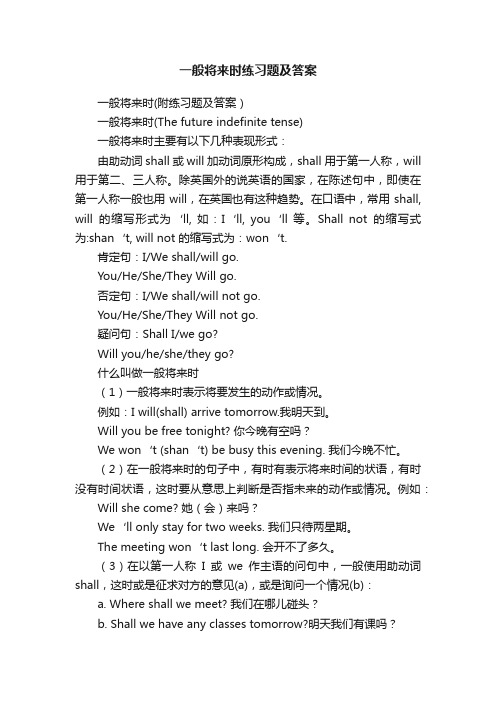
一般将来时练习题及答案一般将来时(附练习题及答案)一般将来时(The future indefinite tense)一般将来时主要有以下几种表现形式:由助动词shall或will加动词原形构成,shall 用于第一人称,will 用于第二、三人称。
除英国外的说英语的国家,在陈述句中,即使在第一人称一般也用will,在英国也有这种趋势。
在口语中,常用shall, will的缩写形式为‘ll, 如:I‘ll, you‘ll 等。
Shall not的缩写式为:shan‘t, will not 的缩写式为:won‘t.肯定句:I/We shall/will go.You/He/She/They Will go.否定句:I/We shall/will not go.You/He/She/They Will not go.疑问句:Shall I/we go?Will you/he/she/they go?什么叫做一般将来时(1)一般将来时表示将要发生的动作或情况。
例如:I will(shall) arrive tomorrow.我明天到。
Will you be free tonight? 你今晚有空吗?We won‘t (shan‘t) be busy this evening. 我们今晚不忙。
(2)在一般将来时的句子中,有时有表示将来时间的状语,有时没有时间状语,这时要从意思上判断是否指未来的动作或情况。
例如:Will she come? 她(会)来吗?We‘ll only stay for two weeks. 我们只待两星期。
The meeting won‘t last long. 会开不了多久。
(3)在以第一人称I或we作主语的问句中,一般使用助动词shall,这时或是征求对方的意见(a),或是询问一个情况(b):a. Where shall we meet? 我们在哪儿碰头?b. Shall we have any classes tomorrow?明天我们有课吗?在这类问句中,近年来也有不少人用will,特别是在美国。
人教版英语英语一般将来时的用法大全及答案

人教版英语英语一般将来时的用法大全及答案一、初中英语一般将来时1.We ________ a party for Kate. It's supposed to be a surprise.A. were havingB. hadC. will haveD. have had【答案】C【解析】【分析】句意:我们将为凯特举办一个聚会。
这应该是个惊喜。
根据句意语境可知举办聚会这个动作还没有发生,需用一般将来时,故选C。
【点评】考查动词时态辨析题。
熟练掌握时态的用法。
2.— Let's go fishing if it this weekend.— But nobody knows if it .A. is fine; will rainB. will be rain; rainsC. will be fine; will rainD. is fine; rains 【答案】 A【解析】【分析】句意:——如果这个周末晴天我们去钓鱼吧。
——但是没人知道是否会下雨。
第一个空前的if引导条件状语从句,意思是“如果”,从句中用一般现在时表示将来;第二个空前的if引导宾语从句,意思是“是否”,根据从句的tomorrow可知用一般将来时;故选A。
【点评】考查动词的时态。
3.—What is your plan for next weekend, Lingling?—I volunteer work in the museum.A. was doingB. didC. have doneD. am going to do【答案】 D【解析】【分析】句意:——玲玲,你下周末打算干什么?——我要去博物馆做义工。
根据题干中的next weekend,可知此句要用一般将来时,故选D。
【点评】考查一般将来时的基本构成及用法。
4.The old woman believes her children ________ back next year.A. comeB. comesC. will comeD. came【答案】 C【解析】【分析】句意:这个老太太认为她的孩子们明年会回来。
英语一般将来时试题(有答案和解析)含解析
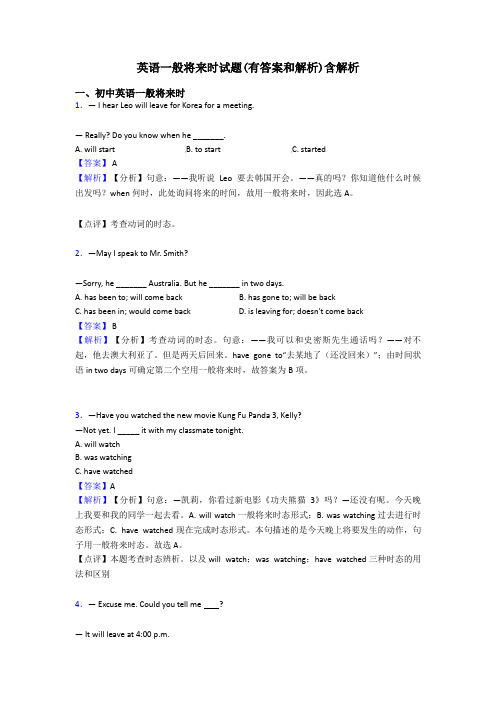
英语一般将来时试题(有答案和解析)含解析一、初中英语一般将来时1.— I hear Leo will leave for Korea for a meeting.— Really? Do you know when he _______.A. will startB. to startC. started【答案】 A【解析】【分析】句意:——我听说Leo要去韩国开会。
——真的吗?你知道他什么时候出发吗?when何时,此处询问将来的时间,故用一般将来时,因此选A。
【点评】考查动词的时态。
2.—May I speak to Mr. Smith?—Sorry, he _______ Australia. But he _______ in two days.A. has been to; will come backB. has gone to; will be backC. has been in; would come backD. is leaving for; doesn't come back【答案】 B【解析】【分析】考查动词的时态。
句意:——我可以和史密斯先生通话吗?——对不起,他去澳大利亚了。
但是两天后回来。
have gone to“去某地了(还没回来)”;由时间状语in two days可确定第二个空用一般将来时,故答案为B项。
3.—Have you watched the new movie Kung Fu Panda 3, Kelly?—Not yet. I _____ it with my classmate tonight.A. will watchB. was watchingC. have watched【答案】A【解析】【分析】句意:—凯莉,你看过新电影《功夫熊猫3》吗?—还没有呢。
今天晚上我要和我的同学一起去看。
A. will watch一般将来时态形式;B. was watching过去进行时态形式;C. have watched现在完成时态形式。
英语时态之一般将来时(练习题及答案)

英语时态之一般将来时一、什么是时态时态就是表示一个动作发生的时间和所处的状态。
“时”就是这个动作发生的“时间”;“态”就是这个动作在某个时刻的“状态”。
二、时间的定义英语中把时间分为三类,即:过去现在将来三、状态的定义状态指的是在某个时刻这个动作所处于的状态。
动词共有四类状态,分别为:一般式、进行式、完成式和进行完成式。
1.一般式表示经常发生的动作,其动词形式为do例:I often get up at 7.我经常在七点钟起床。
2.进行式表示正在进行的动作,其动词形式为“be动词+ doing”例:She is singing a French song.她正在唱一首法语歌。
3.完成式表示对“之前发生动作”的一个总结,其动词形式为“have + done”例:They have found the missing child.他们找到那个失踪的孩子了。
4.完成进行式表示对“正在进行动作”的一个总结,其动词形式“have + been + doing”例:I have been reading books for two hours.我已经连续读书两个小时了。
四.一般将来时(will do):一般将来时表示某个将来的时间发生的动作或存在的状态。
1.在表示预测时,在一般将来时态中will和be going to的区别:(1).用be going to 特别指根据目前的明显迹象来推断某件事将要发生;而will则只是表明说话人认为或相信某件事将要发生。
(2).be going to 通常用来表示说话人预期所说的事件马上或在相当近的将来就要发生;而will 所表示的动作发生的时间可近可远。
2.在表示意愿时,在一般将来时态中will和be going to 的区别:(1)be going to 表示说话人对未来行动的计划或打算,通常是经过事先考虑并含有已经为这一行动做了某些准备的意思。
(2)will表示在说话的时刻立即做出决定将去做某事,事先并没有经过考虑,更没有为这一活动做出事先的准备。
初中英语语法-一般将来时练习题(含答案)

初中英语语法-一般将来时练习题(含答案)1.There will XXX.2.Charlie won't work here next month.3.He is very busy this week。
but he will be free next week.4.There will be a dolphin show in the XXX.5.Are you going to be free tomorrow。
No。
I will be free the day after tomorrow.6.Mother will give me a nice present on my next birthday.7.No。
please don't.8.I will get it for you at once。
1.明天下午将举行一次会议。
2.XXX下个月不会在这里工作。
3.他这周很忙,但下周会有空。
4.明天晚上动物园会有一场海豚表演。
5.你明天会有空吗?不,我后天会有空。
6.我的母亲会在我下一个生日给我一个好礼物。
7.不,请不要。
8.我会立刻拿给你。
9.XXX Saturday?10.If they show up。
we will hold a meeting.11.He will give her a beautiful hat on her next birthday.12.He will write to us as soon as he arrives there.13.He will come back in three days.14.If it doesn't rain tomorrow。
we'll go roller-skating.15.No。
they won't.16.Who will we go XXX?17.We will XXX.18.Tomorrow。
七年级英语一般将来时练习题40题含答案解析

七年级英语一般将来时练习题40题含答案解析1.We are going to have a picnic this Sunday. What about you?I am going to ______ my grandparents.A.visitB.visitsC.visitedD.visiting答案解析:A。
be going to 后面接动词原形,表示计划、打算做某事。
B 选项是第三人称单数形式;C 选项是过去式;D 选项是现在分词,都不符合be going to 的用法。
2.My mother is going to buy some fruit. She is going to the ______.A.supermarketB.hospitalC.libraryD.school答案解析:A。
妈妈买水果通常会去超市。
B 选项医院是看病的地方;C 选项图书馆是借书、看书的地方;D 选项学校是学习的地方。
3.Tom is going to play football tomorrow. He is very ______.A.excitedB.sadC.angryD.tired答案解析:A。
要去踢足球通常会很兴奋。
B 选项悲伤;C 选项生气;D 选项累,都不符合语境。
4.We are going to have an English test next week. I am going to study ______.A.hardB.hardlyzyzily答案解析:A。
study hard 努力学习。
B 选项hardly 是几乎不的意思;C 选项lazy 是懒惰的;D 选项lazily 是懒惰地,都不符合语境。
5.My sister is going to be a doctor. She is going to study ______.A.mathB.scienceC.artD.music答案解析:B。
初中英语一般将来时用法及例句、练习及答案

初中英语一般将来时用法及例句附练习及答案一、一般将来时的定义:一般将来时表示将来某个时间要发生的动作或者存在的状态。
通常与表示将来的时间状语连用,如tomorrow, the day after tomorrow, next year, next month, next week,soon ,in+一段时间(in 100 years)等。
be going to do(动词原形)结构:表示打算、准备做的事情或者肯定要发生的事情。
如:It is going to rain.二、will do 结构表示将来的用法:1. 表示预见Do you think it will rain?You will feel better after a good rest.2. 表示意图I will borrow a book from our school library tomorrow. What will she do tomorrow?三、基本构成如下:一般疑问句构成:(1)will+主语+do…? Will Sarah come to visit me next Sunday?(2)there be 结构的一般疑问句:Will there + be …?Will there be fewer trees? Yes, there will. / No, there won’t否定句构成:will + not (won’t)+doSarah won’t come to visit me next Sunday.特殊疑问句构成:特殊疑问词+will+主语+…?What will Sarah do next Sunday?★★练一练★★一、根据例句,用will改写下列各句例:I don’t feel well today. (be better tomorrow)I’ll be better tomorrow.1. Gina has six classes today. (have a lot of homework tonight)_____________________________2. I’m tired now. (sleep later)_____________________________3. My parents need a new car. (buy one soon)_____________________________4. We can’t leave right now. (leave a little later)_____________________________5. The weather is awful today. (be better tomorrow)_____________________________答案:1. She’ll have a lot of homework tonight.2. I’ll sleep later.3. They’ll buy one soon.4. We’ll leave a little later.5. Maybe it’ll be better tomorrow.★★练一练★★二Many children act in TV shows. They work several 1 _ every day. So they can’t goto regular( 正规的) 2 . How do they get their schooling?In Hollywood, about forty teachers give 3 _ for the children. Their work is very important. They make 4 that the child 5 many different subjects. They make sure6 that the child gets enough rest and 7 .Children in Holleywood must attend classes twenty hours 8 week.If not, they can’t work in TV shows any 9 .TV children are usually 10 pupils, and most of their teachers 11 this kind of week. They give the 12 lessons in many interesting 13 . Sometimes the “classroom” is a Mississipi boat. 14 it is the inside of a spaceship. Often the pupils become 15 stars.( )1. A. hours B. minutes C. seconds D. days ( )2. A. farm B. factory C. school D. club( )3. A. classes B. lessons C. homework D. work ( )4. A. clear B. interesting C. sure D. fun ( )5. A. learns B. knows C. forgets D. loves ( )6. A. still B. yet C. also D. already( )7. A. money B. work C. study D. play ( )8. A. each B. all C. another D. other ( )9. A. time B. week C. more D. way ( )10. A. bad B. good C. busy D. lonely( )11. A. like B. have C. follow D.think ( )12. A. work B. pupils C. friends D. parents ( )13. A. places B. parks C. markets D. rooms ( )14. A. Sometimes B. Often C. Maybe D. Usually( )15. A. lucky B. healthy C. famous D. bright★★练一练★★三阅读理解。
初中英语语法一般将来进行时专项讲解及练习

初中英语语法一般将来进行时专项讲解及练习一般将来进行时的基本用法一般将来进行时是表示动作或事件将来某个时间点正在进行的时态。
它由"助动词 will be"与动词的现在分词形式构成。
例如:I will be studying English tomorrow.(我明天将会正在研究英语。
)一般将来进行时的肯定句式一般将来进行时的肯定句式的结构为:主语 + will be + 动词的现在分词形式。
例如:She will be reading a book tonight.(她今晚将会正在读一本书。
)一般将来进行时的否定句式一般将来进行时的否定句式的结构为:主语 + will not be + 动词的现在分词形式(缩写为won't be)。
例如:They won't be watching TV at that time.(他们那个时候将不会正在看电视。
)一般将来进行时的疑问句式一般将来进行时的疑问句式的结构为:Will + 主语 + be + 动词的现在分词形式 + 其他部分?例如:Will you be playing basketball tomorrow?(你明天会正在打篮球吗?)一般将来进行时的常见时间状语一般将来进行时常与表示将来时间的时间状语连用,例如:tomorrow(明天)、next week(下周)、next month(下个月)等等。
例如:I will be attending a meeting next week.(我下周将会正在参加一个会议。
)练题1. 请将下列句子改为一般将来进行时的肯定句:- We play tennis on Saturdays.- I watch a movie every Friday.2. 请将下列句子改为一般将来进行时的否定句:- She is cooking dinner now.- They are studying for the test.3. 请将下列句子改为一般将来进行时的疑问句:- You are reading a book.- He is going to the park.参考答案:1. We will be playing tennis on Saturdays.I will be watching a movie every Friday.2. She will not be cooking dinner now.They will not be studying for the test.3. Are you reading a book?Is he going to the park?总结一般将来进行时是表示将来某个时间点正在进行的时态。
初一英语一般将来时练习题及答案

初一英语一般将来时练习题及答案精品文档初一英语一般将来时练习题及答案一、选择填空:1. There __________ a meeting tomorrow afternoon.A. will be going toB. will going to beC. is going to beD. will go to be. Charlie ________ here next month.A. isn’t workingB. doesn’t workingC. isn’t going to workingD. won’t work. He ________ very busy this week, he ________ free next week.A. will be; isB. is; isC. will be; will beD. is; will be. There ________ a dolphin show in the zoo tomorrow evening.A. wasB. is going to haveC. will haveD. is going to be. –________ you ________ free tomorrow?– No. I ________ free the day after tomorrow.A. Are; going to; willB. Are; going to be; willC. Are; going to; will beD. Are; going to be; will be1 / 25精品文档. Mother ________ me a nice present on my nextbirthday.A. will givesB. will giveC. givesD. give. – Shall I buy a cup of tea for you?–________.A. No, you won’t.B. No, you aren’t.C. No, please don’t.D. No, please.. – Where is the morning paper?– I ________ if for you at once.A. getB. am gettingC. to getD. will get. ________ a concert next Saturday?A. There will beB. Will there beC. There can beD. There are10. If they come, we ________ a meeting.A. haveB. will haveC. hadD. would have11. He ________ her a beautiful hat on her next birthday.A. givesB. gaveC. will givingD. is going to giving2 / 25精品文档12. He ________ to us as soon as he gets there.A. writesB. has writtenC. will writeD. wrote13. He ________ in three days.A. coming backB. came backC. will come backD. is going to coming back14. If it ________ tomorrow, we’ll goroller-skating.A. isn’t rainB. won’t rainC. doesn’t rainD. doesn’t fine15. – Will his parents go to see the Terra Cotta Warriors tomorrow?– No, ________ .A. they willn’t.B. they won’t.C. they aren’t.D. they don’t.16. Who ________ we ________ swimming with tomorrow afternoon?A. will; goB. do; goC. will; goingD. shall; go17. We ________ the work this way next time.A. doB. will doC. going to doD. will doing3 / 25精品文档18. Tomorrow he ________ a kite in the open air first, and then________ boating in thepark.A. will fly; will goB. will fly; goesC. is going to fly; will goesD. flies; will go19. The day after tomorrow they ________ a volleyball match.A. will watchingB. watchesC. is watchingD. is going to watch0. There ________ a birthday party this Sunday.A. shall beB. will beC. shall going to beD. will going to be1. They ________ an English evening next Sunday.A. are havingB. are going to haveC. will havingD. is going to have2. ________ you ________ free next Sunday?A. Will; areB. Will; beC. Do; beD. Are; be3. He ________ there at ten tomorrow morning.A. willB. isC. will beD. be4 / 25精品文档4. ________ your brother ________ a magazine from the library?A. Are; going to borrowB. Is; going to borrowC. Will; borrowsD. Are; going to borrows5. – Shall I come again tomorrow afternoon?–________ .A. Yes, pleaseB. Yes, you will.C. No, please.D. No, you won’t.6. It ________ the year of the horse next year.A. is going to beB. is going toC. will beD. will is7. ________ open the window?A. Will you pleaseB. Please will youC. You pleaseD. Do you8. –Let’s go out to pl ay football, shall we?– OK. I ________.A. will comingB. be going to comeC. comeD. am coming9. It ________ us a long time to learn English well.A. takesB. will takeC. spendsD. will spend5 / 25精品文档0. The train ________ at 11.A. going to arriveB. will be arriveC. is going toD. is arriving二、动词填空:1. I ______in a minute. I ______all my work before I ______2. —How long _____ you _____in our country?—I _____to be here for about one more year.—I _____to visit the other parts of your country.—What ______ you ______after you ______here?—I ______home and ______a job.3. I ______tired. I ______to bed early tonight.4. Mary’s birthday is next Monday, her mother _____her a present.三、句型转换:1. People in the north often go skating in winter.2. There are two cinemas in that town.3. He comes back late.4. She is a conductor of a train.leave). .A. they willn’t.B. they won’t.C. they aren’t.D. they don’t.6 / 25精品文档16. Who ________ we ________ swimming with tomorrow afternoon?A. will; goB. do; goC. will; goingD. shall; go17. We ________ the work this way next time.A. doB. will doC. going to doD. will doing18. Tomorrow he ________ a kite in the open air first, and then________boating in the park.A. will fly; will goB. will fly; goesC. is going to fly; will goesD. flies; will go19. The day after tomorrow they ________ a volleyball match.A. will watchingB. watchesC. is watchingD. is going to watch0. There ________ a birthday party this Sunday.A. shall beB. will beC. shall going to beD. will going to be1. They ________ an English evening next Sunday.A. are havingB. are going to haveC. will havingD. is going to have7 / 25精品文档2. ________ you ________ free next Sunday?A. Will; areB. Will; beC. Do; beD. Are; be3. He ________ there at ten tomorrow morning.A. willB. isC. will beD. be4. ________ your brother ________ a magazine from the library?A. Are; going to borrowB. Is; going to borrowC. Will; borrowsD. Are; going to borrows5. – Shall I come again tomorrow afternoon?–________ .A. Yes, pleaseB. Yes, you will.C. No, please.D. No, you won’t.6. It ________ the year of the horse next year.A. is going to beB. is going toC. will beD. will is7. ________ open the window?A. Will you pleaseB. Please will youC. You pleaseD. Do you8. –Let’s go out to play football, shall we?– OK. I ________.8 / 25精品文档A. will comingB. be going to comeC. comeD. am coming0. The train ________ at 11.A. going to arriveB. will be arriveC. is going toD. is arriving一般将来时练习一完成句子:1. 我打算明天和朋友去野炊。
初一英语一般将来时练习题及答案参考

这篇关于初⼀英语⼀般将来时练习题及答案参考,是特地为⼤家整理的,希望对⼤家有所帮助!知识点⼀、⼀般将来时表⽰将要发⽣的动作或存在的状态及打算、计划或准备做某事。
⼀般将来时由助动词shall或will加动词原型构成,shall⽤于第⼀⼈称,will⽤于第⼆、三⼈称。
⼆.时间状语:tomorrow, next day(week, month, year…),soon, in a few minutes, by…,the day after tomorrow, etc.三.基本结构:1、肯定句主语+am/is/are+going to + do;will/shall + do.2.否定形式:am/is/are not going to do ;will/shall not do。
3.⼀般疑问句:be放于句⾸;will/shall提到句⾸。
例句:They are going to have a competition with us in studies.他们将有⼀场⽐赛和我们⼀起研究。
It is going to rain.天要下⾬了。
四、注意1、在时间或条件状语从句中,⼀般不能⽤将来时态,⽽⽤现在时态代替:they’ll fight till they win complete victory.i’ll be round to see you if i have time tomorrow.2、表⽰将要发⽣的动作或情况,除了⼀般将来时外,还有⼀些其他结构和时态:①. be going +不定式(表打算、准备作的事或即将发⽣或肯定要发⽣的事):we ‘re going to put up a building here.how are you going to spend your holiday?who is going to speak first?②. be +不定式(表⽰按计划安排要发⽣的事或⽤来征求对⽅的意见):when is the factory to go into production?the line is (going) to be opened to traffic next week.am i to (=shall i ) go on with the work?③.⼀般现在时(限于某些动词,表⽰按计划或时刻要发⽣的事):school finishes on january 18th.we get off at the next stop.when does the winter vacation begin?④.现在进⾏时(限于某些动词,表⽰按计划安排要发⽣的事):we are having an english evening tonight.they are playing some folk music next.i am talking the children to the zoo (on sunday ).3、在表⽰打算或准备时,如不提时间、条件等,多⽤be going to这个结构,⽤⼀般将来时时很少的,特别是在⼝语中:he is going to buy a dictionary.(很少说he will buy a dictionary.)在谈即将发⽣的情况时,⽤be going to 这个结构也多⼀些。
(完整版)一般将来时初中语法
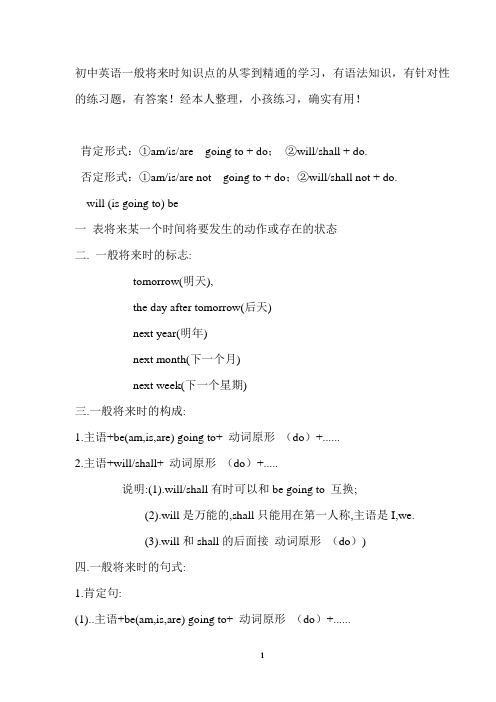
初中英语一般将来时知识点的从零到精通的学习,有语法知识,有针对性的练习题,有答案!经本人整理,小孩练习,确实有用!肯定形式:①am/is/are going to + do;②will/shall + do.否定形式:①am/is/are not going to + do;②will/shall not + do.will (is going to) be一表将来某一个时间将要发生的动作或存在的状态二. 一般将来时的标志:tomorrow(明天),the day after tomorrow(后天)next year(明年)next month(下一个月)next week(下一个星期)三.一般将来时的构成:1.主语+be(am,is,are) going to+ 动词原形(do)+......2.主语+will/shall+ 动词原形(do)+.....说明:(1).will/shall有时可以和be going to 互换;(2).will是万能的,shall只能用在第一人称,主语是I,we.(3).will和shall的后面接动词原形(do))四.一般将来时的句式:1.肯定句:(1)..主语+be(am,is,are) going to+ 动词原形(do)+......(2)..主语+will/shall+ 动词原形(do)+.....2.否定句:(1)..主语+be(am,is,are) not going to+ 动词原形(do)+......(2)..主语+will/shall not+ 动词原形(do)+.....3.一般疑问句:(1).Am/Is,Are+主语+going to+ 动词原形(do)+....(2).Will//shall+主语+ 动词原形(do)+...4.特殊疑问句:(1).What (Where, How...)+be (am,is,are)+主语+ going to + 动词原形(do)+...?(2). What (When,Where,How...) +will/shall+ 主语+ 动词原形(do)+...?二、基本结构:①be going to + do;②will+ do.三、否定句:在be动词(am, is, are)后加not或will后加not成won’t。
初中英语一般将来时讲解与练习(含答案)

一般将来时讲解与练习一、概念:一般将来时表示将来某个时间要发生的动作或存在的状态,及计划、打算或准备做某事。
常常与表示将来的时间状语连用。
如:tomorrow,next day(week, month, year…),soon,the day after tomorrow(后天)等。
二、常用的表达形式共有五种,现归纳如下:(一)“will +动词原形”这一形式,主要用于在以下几个方面:1、表示单纯的未来“将要”通用于各个人称。
eg:They will go to visit the factory tomorrow. 明天他们将去工厂参观。
I’ll come with Wang Bing and Yang Ling. 我将和王兵、杨玲一起来。
The rain will stop soon. 雨很快就要停了。
2、表示不以人的意志为转移的自然发展的未来的事。
eg:Today is Saturday. Tomorrow will be Sunday. 今天是星期六。
明天是(将)是星期日。
He will be thirty years old this time next year. 明年这个时候他就(将)三十岁。
3、问对方是否愿意做某事或表示客气地邀请或命令。
eg: Will you please turn on the radio? 请打开收音机好吗?Will you go to the zoo with me? 你和我一起去动物园好吗?Shall we go there at five? 我们五点钟去那儿,好吗?Will you please open the door? 请你把门打开,好吗?注:在口语中will用于所有人称,书面语中第一人称常用shall。
(二)“be going to+动词原形”的形式,表示事先经过考虑、安排好打算、计划要做的事情以及已有迹象表明必将发生某事,意为“打算;就要”。
(英语)初中英语语法 一般将来时练习题含答案

初中英语:一般将来时专项练习题1.My book ___________ here in two days through the EMS.A.are sent B.is sent C.will be sent D.will send 【答案】C【解析】【详解】句意:两天后,我的书将通过特快专递被寄送到这里。
根据in two days可知此处用一般将来时,结合句意,主语my book与谓语send 之间是被动语态,故此处用一般将来时的被动语态,故选C。
2.—What will you do with the old newspapers?—The old newspapers as well as the old books to the recycling company.A.is going to send B.are going to sendC.is going to be sent D.are going to be sent【答案】D【解析】【详解】试题分析:句意:-你将怎样处理旧报纸?-旧报纸和旧书都将送到回收公司。
newspapers 和 books都是send这一动作的承受者,该用被动语态,而被动语态是由“be + 实意动词的过去分词”构成,newspapers是复数名词,所以选D。
考点:考查被动语态。
3.The school music festival ________ next Friday and I have already prepared for it.A.was held B.is held C.will be held D.have been held【答案】C【解析】【详解】句意:学校音乐节在下周五举行,我已经准备好了。
考查一般将来时的被动语态。
was held一般过去时的被动语态;is held一般现在时的被动语态;will be held一般将来时的被动语态;have been held现在完成时的被动语态。
初一英语一般将来时单选题40题及答案

初一英语一般将来时单选题40题及答案1.There will be a sports meeting in our school next week. We are all looking forward to it. What will you do in the sports meeting?A.I will play basketball.B.I played basketball.C.I am playing basketball.D.I play basketball.答案:A。
本题考查一般将来时的用法。
A 选项“will play basketball”表示将来要做的事情,符合题意;B 选项“played basketball”是一般过去时;C 选项“am playing basketball”是现在进行时;D 选项“play basketball”是一般现在时。
2.My friend and I will go to the park tomorrow. What will we take with us?A.Some books.B.Some bread.C.Some water.D.Some fruits.答案:C。
在去公园的场景中,水通常是比较可能携带的物品。
A 选项书在去公园的场景中不太常见;B 选项面包可能不是首选;D 选项水果携带起来可能不太方便,且容易弄脏。
3.We will have a picnic on Sunday. What will you bring?A.A kite.B.A ball.C.Some food.D.A book.答案:C。
野餐通常需要带食物。
A 选项风筝不是野餐必须带的;B 选项球在野餐场景中不是主要物品;D 选项书在野餐中不是重点携带物品。
4.The teacher said we will have an exam next week. What will you do to prepare for it?A.I will study hard.B.I studied hard.C.I am studying hard.D.I study hard.答案:A。
初中一般将来时讲义【含答案】
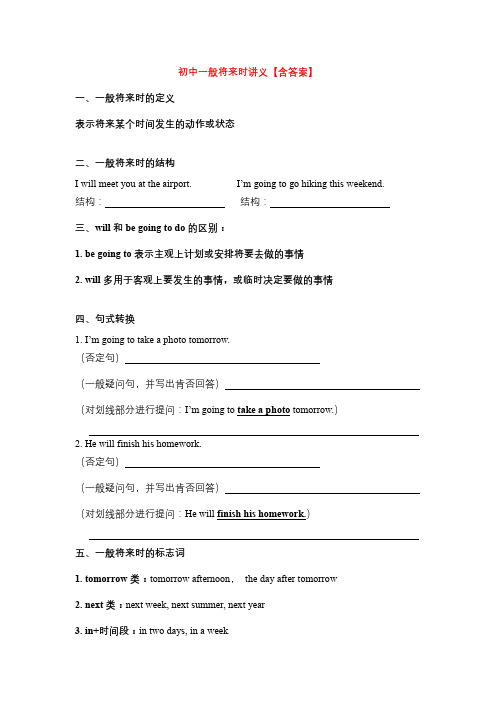
初中一般将来时讲义【含答案】一、一般将来时的定义表示将来某个时间发生的动作或状态二、一般将来时的结构I will meet you at the airport. I’m going to go hiking this weekend.结构:结构:三、will和be going to do的区别:1. be going to表示主观上计划或安排将要去做的事情2. will多用于客观上要发生的事情,或临时决定要做的事情四、句式转换1. I’m going to take a photo tomorrow.(否定句)(一般疑问句,并写出肯否回答)(对划线部分进行提问:I’m going to take a photo tomorrow.)2. He will finish his homework.(否定句)(一般疑问句,并写出肯否回答)(对划线部分进行提问:He will finish his homework.)五、一般将来时的标志词1. tomorrow类:tomorrow afternoon,the day after tomorrow2. next类:next week, next summer, next year3. in+时间段:in two days, in a week4.其他:in the future, one day, someday【课堂练习】1. We don’t know when __________ next week. Please call me when he arrives.A. will he arriveB. does he arriveC. he will arriveD. he arrives2. —How soon will he come back to Guangzhou?—I have no idea. Maybe he __________ in one or two days.A. will comeB. comesC. comeD. came3. ---will the train arrive?---It the station in 50 minutes.A. How soon; will get toB. How soon; arriveC. How long; will reachD. How far; gets to4. Will you at the bus stop at 10:30?A. meetingB. meetsC. meetD. met5. Lily and I to the concert it we free next week.A. go; areB. go; will beC. will go; will beD. will go; are初中一般将来时讲义(答案)一、一般将来时的定义表示将来某个时间发生的动作或状态二、一般将来时的结构I will meet you at the airport. I’m going to go hiking this weekend.结构:will+动词原形结构:am/is/are going to+动词原形三、will和be going to do的区别:1. be going to表示主观上计划或安排将要去做的事情2. will多用于客观上要发生的事情,或临时决定要做的事情四、句式转换1. I’m going to take a photo tomorrow.(否定句)I’m not going to take a photo tomorrow.(一般疑问句,并写出肯否回答)---Are you going to take a photo tomorrow?---Yes, I am. / No, I’m not.(对划线部分进行提问:I’m going to take a photo tomorrow.)What are you going to do tomorrow?2. He will finish his homework.(否定句)He will not finish his homework.(一般疑问句,并写出肯否回答)---Will he finish his homework?---Yes, he will. /No, he won’t.(对划线部分进行提问:He will finish his homework.)What will he do?五、一般将来时的标志词1. tomorrow类:tomorrow afternoon,the day after tomorrow2. next类:next week, next summer, next year3. in+时间段:in two days, in a week4.其他:in the future, one day, someday【课堂练习】1. We don’t know when __________ next week. Please call me when he arrives.A. will he arriveB. does he arriveC. he will arriveD. he arrives2. —How soon will he come back to Guangzhou?—I have no idea. Maybe he __________ in one or two days.A. will comeB. comesC. comeD. came3. ---will the train arrive?---It the station in 50 minutes.A. How soon; will get toB. How soon; arriveC. How long; will reachD. How far; gets to4. Will you at the bus stop at 10:30?A. meetingB. meetsC. meetD. met5. Lily and I to the concert it we free next week.A. go; areB. go; will beC. will go; will beD. will go; are。
七年级英语句型及语法(英语一般将来时)附答案百度文库
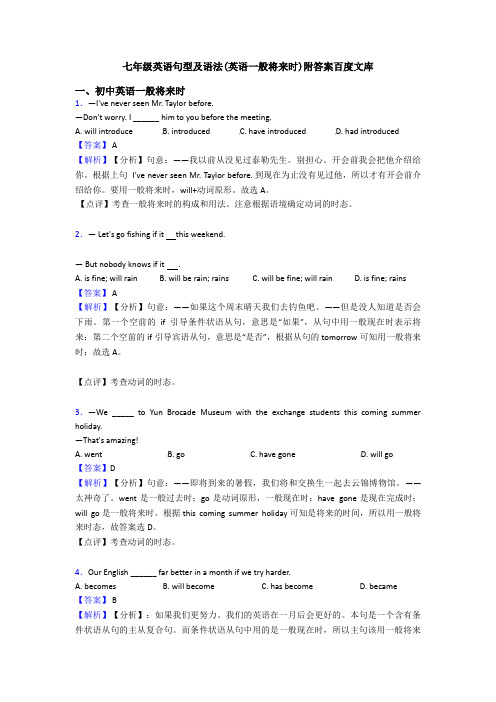
七年级英语句型及语法(英语一般将来时)附答案百度文库一、初中英语一般将来时1.—I've never seen Mr. Taylor before.—Don't worry. I ______ him to you before the meeting.A. will introduceB. introducedC. have introducedD. had introduced【答案】 A【解析】【分析】句意:——我以前从没见过泰勒先生。
别担心。
开会前我会把他介绍给你。
根据上句 I've never seen Mr. Taylor before. 到现在为止没有见过他,所以才有开会前介绍给你。
要用一般将来时,will+动词原形。
故选A。
【点评】考查一般将来时的构成和用法。
注意根据语境确定动词的时态。
2.— Let's go fishing if it this weekend.— But nobody knows if it .A. is fine; will rainB. will be rain; rainsC. will be fine; will rainD. is fine; rains 【答案】 A【解析】【分析】句意:——如果这个周末晴天我们去钓鱼吧。
——但是没人知道是否会下雨。
第一个空前的if引导条件状语从句,意思是“如果”,从句中用一般现在时表示将来;第二个空前的if引导宾语从句,意思是“是否”,根据从句的tomorrow可知用一般将来时;故选A。
【点评】考查动词的时态。
3.—We _____ to Yun Brocade Museum with the exchange students this coming summer holiday.—That's amazing!A. wentB. goC. have goneD. will go【答案】D【解析】【分析】句意:——即将到来的暑假,我们将和交换生一起去云锦博物馆。
(完整版)初一下英语一般将来时

(完整版)初⼀下英语⼀般将来时第三讲:⼀般将来时⼀、定义:⼀般将来时表⽰将来某⼀时刻的动作或状态,或将来某⼀段时间内经常的动作或状态。
1.表⽰将来某⼀时刻的动作或状态:e.g. She will buy a new bike tomorrow.We will drive to the park next week.I shall visit my grandparents this weekend.They are going to play computer games this evening.I am going to have a big meal.2.将来某⼀段时间内经常的动作或状态:e.g. He is gong to have a big house next year .She will have a daughter.The cat will have a master.The dog will have a house.⼆、常与⼀般将来时连⽤的词:1. 时间状语系列:next Tuesdaynext weeknext yearthe coming Sundaythis afternoontomorrowtonightin a few minutesin the futurein five yearsfrom now onsoon三、⼀般将来时的构成1. will/shall的⼀般将来时构成:主语 + will/shall + 动词原形+其它I will/shall go to Beijing next week.主语是第⼀⼈称时 ----- shallwill not = won’tshall not= shan’t【活学活⽤】按照要求改写句⼦1、My teacher will teach us next term.(改为否定句)___________________________________________ 2、I shall not buy new clothes this month.(改为肯定句) ___________________________________________ 3、She is playing computer games.(改为将来时)___________________________________________ 4、We shan't take part in the football match.(改为肯定句) ___________________________________________ 5、I visit my grandparents every weekend.((改为将来时) ___________________________________________ 2. be going to的⼀般将来时构成:主语+ be going to + 动词原形+ 其他She is going to play basketball this afternoon.主语是”I”时 ----- am主语为单数时 ----- is主语为复数及you时 ----- are否定句的构成: 主语 + be not going to + 动词原形+ 其他She is not going to play basketball this afternoon.is not = isn’tam not = ’m notare not = aren’twill或shall与be going to区别:1. will或shall⽤法总结:1)表⽰⼀个将来的动作或状态,“要…,会…”She will go to the park tomorrow.2)表⽰不以⼈的意志为转移的⾃然发展的事。
(完整版word)七年级英语句型及语法(英语一般将来时)及答案

(完整版word)七年级英语句型及语法(英语一般将来时)及答案一、初中英语一般将来时1.Hold your dream,_____ you might regret some day.A. andB. orC. butD. so【答案】 B【解析】【分析】考查连词.句意:坚持你的梦想,___有一天你会后悔的。
A和,表示并列关系,B否则、或者,C但是,表示转折关系,D所以,表示因果关系。
结合语境可知,用or否则,选B.2.-- Tommy, do you know if they _____ to the zoo this Sunday if it _____?-- Sorry, I have no idea.A. will go; is fineB. go; is fineC. will go; is going to be fineD. go; will be fine【答案】 A【解析】【分析】句意:——Tommy,你知道这个星期天如果晴天他们是否去动物园吗?——对不起,我不知道。
第一个空前的if引导宾语从句,意思是“是否”,根据从句的tomorrow可知用一般将来时;第二个空前的if引导条件状语从句,意思是“如果”,从句中用一般现在时表示将来,故选A。
【点评】考查动词的时态。
3.We____ shopping unless it ____ tomorrow.A. will go, will rainB. go, will rainC. will go, rainsD. go, rains【答案】C【解析】【分析】句意:除非明天下雨,否则我们将会去购物。
unless 除非,引导条件状语从句,从句中应该用一般现在时表示将来,主句用一般将来时。
故应选C。
【点评】考查动词时态。
4.— Have you watched the new movie Jurassic World, Steven?— Not yet. I ________ it with my cousin this evening.A. will watchB. was watchingC. watchedD. have watched【答案】 A【解析】【分析】句意:你看过《侏罗纪世界》这部新电影吗,史蒂文? ——没有。
人教版英语英语一般将来时用法总结含答案解析百度文库

人教版英语英语一般将来时用法总结含答案解析百度文库一、初中英语一般将来时1.Mr. Green, a famous writer, ______our school next week.A. visitedB. visitsC. was visitingD. will visit【答案】 D【解析】【分析】句意:格林先生,一位著名的作家,下周要来我们学校参观。
A是一般过去时;B是一般现在时;C是过去进行时;D是一般将来时。
根据next week可知此处用一般将来时,故答案为D。
【点评】考查动词的时态,注意找语境中的时间状语。
2.-- Tommy, do you know if they _____ to the zoo this Sunday if it _____?-- Sorry, I have no idea.A. will go; is fineB. go; is fineC. will go; is going to be fineD. go; will be fine【答案】 A【解析】【分析】句意:——Tommy,你知道这个星期天如果晴天他们是否去动物园吗?——对不起,我不知道。
第一个空前的if引导宾语从句,意思是“是否”,根据从句的tomorrow可知用一般将来时;第二个空前的if引导条件状语从句,意思是“如果”,从句中用一般现在时表示将来,故选A。
【点评】考查动词的时态。
3.— Where is your uncle?—He____ America and he ____New York for two weeks.A. has been to; has been inB. has gone to; will stay inC. has been in; has been toD. has stayed in; has gone to【答案】 B【解析】【分析】句意:——你叔叔在哪里?——他去美国了并且他要在纽约呆两周。
- 1、下载文档前请自行甄别文档内容的完整性,平台不提供额外的编辑、内容补充、找答案等附加服务。
- 2、"仅部分预览"的文档,不可在线预览部分如存在完整性等问题,可反馈申请退款(可完整预览的文档不适用该条件!)。
- 3、如文档侵犯您的权益,请联系客服反馈,我们会尽快为您处理(人工客服工作时间:9:00-18:30)。
人教版英语七年级英语句型及语法(英语一般将来时)及答案百度文库一、初中英语一般将来时1.Mr. Green, a famous writer, ______our school next week.A. visitedB. visitsC. was visitingD. will visit【答案】 D【解析】【分析】句意:格林先生,一位著名的作家,下周要来我们学校参观。
A是一般过去时;B是一般现在时;C是过去进行时;D是一般将来时。
根据next week可知此处用一般将来时,故答案为D。
【点评】考查动词的时态,注意找语境中的时间状语。
2.—May I speak to Mr. Smith?—Sorry, he _______ Australia. But he _______ in two days.A. has been to; will come backB. has gone to; will be backC. has been in; would come backD. is leaving for; doesn't come back【答案】 B【解析】【分析】考查动词的时态。
句意:——我可以和史密斯先生通话吗?——对不起,他去澳大利亚了。
但是两天后回来。
have gone to“去某地了(还没回来)”;由时间状语in two days可确定第二个空用一般将来时,故答案为B项。
3.Robots more heavy work for us in the future.A. will doB. didC. have doneD. were doing【答案】A【解析】【分析】句意:在将来, 机器人将为我们做更多繁重的工作。
根据in the future 可知此处用一般将来时, 故选A。
【点评】一般将来时4.— I hear Leo will leave for Korea for a meeting.— Really? Do you know when he _______.A. will startB. to startC. started【答案】 A【解析】【分析】句意:——我听说Leo要去韩国开会。
——真的吗?你知道他什么时候出发吗?when何时,此处询问将来的时间,故用一般将来时,因此选A。
【点评】考查动词的时态。
5.—Tom wants to know if you ________ a picnic next Sunday.—Yes. But if it ________, we'll visit the museum instead.A. will have; will rainB. have; rainsC. have; will rainD. will have; rains 【答案】D【解析】【分析】句意:汤姆想知道下周日你们是否去野炊。
是的,但是如果下雨的话,我们将改去参观博物馆。
if引导宾语从句时,意为“是否”,句子时态根据句意选用,if 作为“假如”时,引导的是条件状语从句,主句用一般将来时,从句用一般现在时表示将来,故选D【点评】此考点也是中考最喜欢出现的考点,if除了可以引导条件状语从句外,还可以引导宾语从句,翻译成“是否”。
引导宾语从句时没有“主将从现”的说法。
除了if外,还有when, as soon as也一样要注意“主将从现”。
6.—Could you tell me_______?—In five minutes, at 10: 25.A. when did the next underground arriveB. when the next underground arrivedC. when will the next underground arriveD. when the next underground will arrive【答案】D【解析】【分析】句意:—你能告诉我下一个地铁什么时候到吗?—五分钟后,10点25分。
tell后跟宾语从句,宾语从句需用陈述句语序,A、C两项都是疑问句语序,可排除。
根据答语In five minutes,结合句意语境,可知还没有到站,需用一般将来时态,故答案选D。
【点评】考查宾语从句。
根据语境确定宾语从句的时态,注意陈述语序。
7.The old woman believes her children ________ back next year.A. comeB. comesC. will comeD. came【答案】 C【解析】【分析】句意:这个老太太认为她的孩子们明年会回来。
句子时态是含有宾语从句的主从复合句,主句时态是一般现在时,从句用其相应的时态,根据next year可知从句的时态是一般将来时,结构为will do,故为will come,故选C。
【点评】此题考查宾语从句的时态。
8.— Do you know when he tomorrow?— Don't worry. I think as soon as he , he will give you a call.A. will come; will comeB. will come; comesC. comes; will comeD. comes; comes 【答案】 B【解析】【分析】这是一道考查一般将来时以及as soon as 结构使用的题目。
句意:你知道他明天什么时候来吗?不用担心,我认为他来了,他会给你打电话的。
由tomorrow知第一句为一般将来时,故第一个空填will come 形式;as soon as 引导时间状语从句,主句用一般将来时,从句用一般现在时表一般将来时,故第二个空填comes。
故选B。
【点评】本题考查一般将来时,以及as soon as结构的用法,在平时学习中要充分掌握时态,以及常见的引导时间状语从句的短语的用法。
9.If our government attention to controlling food safety now, our health ________ in danger.A. won't pay; isB. doesn't pay; isC. won't pay; will beD. doesn't pay; will be【答案】 D【解析】【分析】句意:如果我们的政府现在不注意控制食品安全,我们的健康就会出于危险之中。
结合语境可知本句主语描述的是将来某时进行的动作,故用一般将来时态。
当主句描述将来时态,条件状语从句中用一般现在时态表示将来动作,结合语境可知选D。
【点评】英语中的时态主要是借助于时间状语与上下文语境来进行判断。
解答此类题型,首先要注意句子中的时间状语,如果没有则要通过分析上下文,结合语境来判断句子的时态。
英语疑问句中一般具有时态上的对应关系,注意结合这一特点进行区分。
英语状语从句的时态与主句有比较紧密的联系,若主句为一般将来时,时间和条件状语从句通常要用一般现在时表示将来,而不能直接使用将来时态。
10.—You'd better take an umbrella. The weather report says it in the afternoon.— Thank you. I will put one in my bag.A. will rainB. rainsC. is raining【答案】 A【解析】【分析】句意:——你最好带把伞。
天气预报说是下午要下雨。
——谢谢你。
我会在包里放一个。
A一般将来时,B一般现在时,C现在进行时,根据 in the afternoon和 I will put one in my bag 可知时态是一般将来时,故选A。
【点评】考查时态,注意一般将来时的用法。
11.Mr. Smith our school next year.A. will visitB. visitsC. was visitingD. visited【答案】 A【解析】【分析】句意:史密斯先生下一年将参观我们的学校。
根据时间状语next year判断,时态为一般将来时态,故答案为A。
【点评】考查动词时态,本题涉及一般将来时的应用,表示在将来某个时间将要发生的动作或存在的状态。
12.We ________ a party for Kate. It's supposed to be a surprise.A. were havingB. hadC. will haveD. have had【答案】C【解析】【分析】句意:我们将为凯特举办一个聚会。
这应该是个惊喜。
根据句意语境可知举办聚会这个动作还没有发生,需用一般将来时,故选C。
【点评】考查动词时态辨析题。
熟练掌握时态的用法。
13.If you want to visit the Palace Museum, I ________ tickets for you tomorrow.A. will bookB. bookedC. have bookedD. was booking【答案】 A【解析】【分析】句意:如果你想参观故宫博物馆,我明天给你订票。
book,订购,A.一般将来时;B.一般过去时;C.现在完成时;D.过去进行时。
根据tomorrow,可知动词用一般将来时,故选A。
【点评】考查动词的时态,注意一般将来时的用法。
14.I don't know if he _____ tomorrow. If he _____, I'll go to see him.A. leaves; gets upB. will go; will goC. will come; comesD. is arriving; leaves【答案】 C【解析】【分析】我不知道明天他是否会来。
如果他来了,我会去看他。
结合语境可知前文是宾语从句,根据时间状语可知从句中描述的是将来的动作,故用一般将来时态。
下文是条件状语从句,当主句描述将来动作时,条件状语从句中用一般现在时态表示将来的动作,故选C。
【点评】英语宾语从句的时态和主句没有必然的联系,需结合语境进行具体分析。
而英语状语从句的时态与主句有比较紧密的联系,若主句为一般将来时,时间和条件状语从句通常要用一般现在时表示将来,而不能直接使用将来时态。
15.Look on the bright side of life,and imagine that you ______ a happy and successful future.A. hadB. will haveC. haveD. have had【答案】 B【解析】【分析】考查时态.句意"看看生活中美好的一面,想象你会有一个幸福和成功的未来.".A过去时.B一般将来时态.C动词原形.D现在完成时态.结合语境"看看生活中美好的一面,想象你___一个幸福和成功的未来.",由future未来,可知,表示将来,用一般将来时态.答案是B.16.—Have you watched the new movie Kung Fu Panda 3, Kelly?—Not yet. I _____ it with my classmate tonight.A. will watchB. was watchingC. have watched【答案】A【解析】【分析】句意:—凯莉,你看过新电影《功夫熊猫3》吗?—还没有呢。
